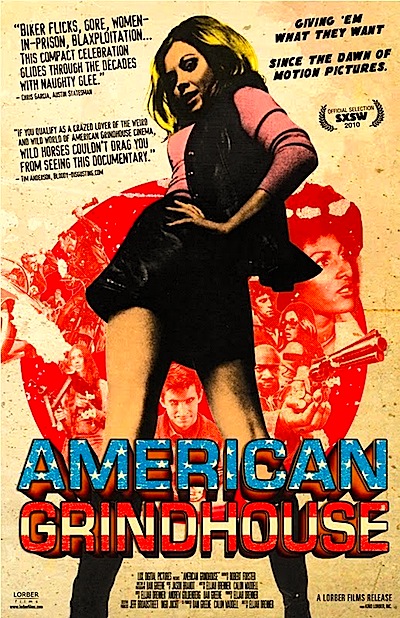By Joe Bendel. It seems like every hipster filmmaker wants to make a retro-grindhouse movie these days, but the results are usually pretty lame. The truth is, real-deal grindhouse auteurs did not have time for posing. They had to get their shots before the cops shut them down. The subversive attitude of their oeuvre flowed organically from their dodgy working environment, thoroughly infusing the zero-budget cult films Elijah Drenner lovingly surveys in American Grindhouse, which opened last Friday in New York.
“Exploitation” films were independently produced movies with some grabby element to “exploit” which audiences could not otherwise find from mainstream studio fare. Though not necessarily limited to sex and violence, those were certainly the biggies. Drugs and circus freaks were also reliable hooks. Such films were typically booked into seedy, pre-Giuliani-era Times Square-style theaters, often playing continuously without formal start times (hence the grind in grindhouse).
 Drenner and his battery of film scholars start with the silent era, when Universal hit pay dirt with Traffic in Souls, a rather sensationalistic story of white slavery – carrying the fig leaf of a progressive reform message. It established the template many exploitation filmmakers would profitably follow for decades, including the so-called “Forty Thieves” emerging in 1930’s.
Drenner and his battery of film scholars start with the silent era, when Universal hit pay dirt with Traffic in Souls, a rather sensationalistic story of white slavery – carrying the fig leaf of a progressive reform message. It established the template many exploitation filmmakers would profitably follow for decades, including the so-called “Forty Thieves” emerging in 1930’s.
Grindhouse surveys a number of rather self-explanatory sub-genres, like “birth of a baby” movies, beach party movies, faux nudist documentaries, “nudie cuties,” “roughies,” women-in-prison films, Nazi-exploitation (exemplified with class and distinction by Ilsa: She-Wolf of the SS), and the ageless blaxploitation picture. Amongst his many talking heads, Drenner notably scored sit-down interview time with Fred Williamson, of Black Caesar and Hell Up in Harlem fame, who looks and sounds as cool as ever.
While Grindhouse focuses squarely on the filmmakers, it is not a cheap tease. Indeed, many of the voluminous clips from the seminal classics under discussion are real eye-poppers. Still, Drenner maintains the right balance of (half-) serious cultural history and crowd pleasing naughty bits.
Well-stocked with wild stories and vintage scenes of pure lunacy, Grindhouse is a whole lot of fun, sort of like an old-school Hollywood Boulevard version of That’s Entertainment. Like the “birth of a baby” films it documents, Grindhouse is in fact educational, but its subject matter is definitely mature. Ultimately, it is a winning tribute to genuinely independent filmmakers, marginalized and even demonized though they might have been. Heartily recommended to those who already have a good idea what they will be getting into, Grindhouse opened this past Friday in New York at the Cinema Village.
Posted on Feburary 9th, 2011 at 11:41am.
It may sound funny, but the best homage to Grindhouse cinema I’ve seen in recent memory hasn’t been the heavy-handed Tarantino / Rodriguez films, but rather Rob Zombie’s “The Devil’s Rejects.”
I also think the “Resident Evil” movies have the trappings of Grindhouse cinema.
People act like this kind of moviemaking has disappeared, but it hasn’t. The grindhouses and drive-ins themselves have mostly disappeared (or transmuted into something else), but the kind of movies they used to show are still being made, they’ve just moved to DVD and cable. It’s funny seeing all these hipster filmmakers making faux-“grindhouse” movies, when they would run a mile from from the living relatives of the very movies they are making tributes to.
Boy, Joshua, I couldn’t agree with you more on that point. I love how Tarantino and Rodriguez went out and made a $50 million ‘grindhouse’ film. Apparently it didn’t occur to them – or maybe it did – that today’s ‘grindhouse’ features are actually made for about %1 of that budget.